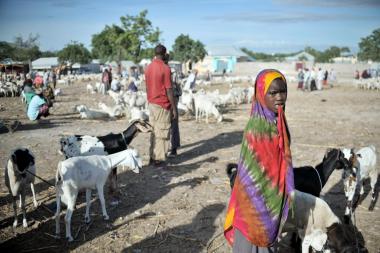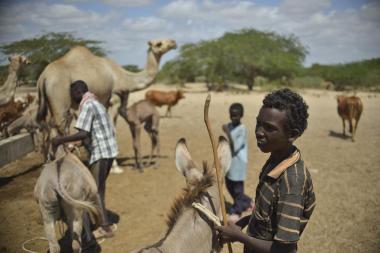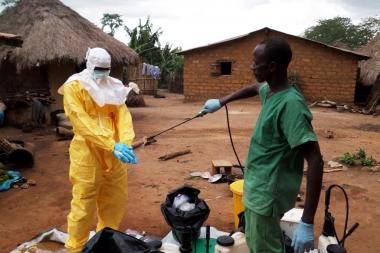Blog
The impacts of Covid-19 on farmers and herders in South Sudan: one cannot farm alone
Covid-19 and pandemic responses have affected farmers, pastoralists and agro-pastoralists in South Sudan in many different ways. SPARC interviewed some of the people impacted.
Publisher SPARC
"No one is farming these days because people are afraid to move in groups. They say the virus catches people when they are close to each other. This has prevented us from moving to the fields. We have given up because one cannot farm alone in South Sudan," said a young farmer in Bentiu, South Sudan.
How are Covid-19 and formal responses to the pandemic impacting agro-pastoral livelihood activities in South Sudan? SPARC researchers conducted semi-structured interviews with 45 farmers and cattle-keepers in South Sudan’s Rubkona County in September 2020 to answer this question. We spoke to men and women of diverse age and socioeconomic status, in Bentiu and Rubkona Town, the Bentiu Protection of Civilian (PoC) site, and various nearby rural villages and cattle camps. We selected the people we interviewed in an effort to document varying perspectives and experiences of Covid-19.
Farmers and herders repeatedly told us that disruptions to social interaction and mutual support posed the most significant obstacles to farming and cattle-keeping during the pandemic. In many cases, these disruptions were a direct result of formal measures and public health messaging promoting social distancing and other disease-prevention measures. Our research indicates that aid actors must account for the social nature of agro-pastoral livelihoods when designing Covid-19 responses in order to maximise intervention impact, and avoid inadvertently exacerbating livelihood disruptions.
Social livelihoods in South Sudan
In many parts of South Sudan, agro-pastoral livelihood activities are conducted in informal social groups. These groups are self-mobilising, may be composed of kin and non-kin, and primarily serve to facilitate collective action and the exchange of support between group members and their households, for example, by redistributing livestock to one another if a peer’s herd is depleted, perhaps because of violence or disease.
"When my group member gets into a problem and requires cattle, I give him one of mine as part of our group’s contribution to him. I do this because I want to protect his cattle from being finished by problems", explained a cattle-keeper in Panyijar County. In other circumstances, group members might share food and cash with each other in response to particular hardships, such as illness or the death of a family member. Group members may also help one another clear and cultivate land, build shelters and perform other domestic activities.
These informal livelihood groups have become especially important sources of support for their members during South Sudan’s current protracted humanitarian crisis. In a recent Mercy Corps study in South Sudan’s Rubkona and Panyijar Counties, 21% of survey respondents said that informal livelihood groups were among the most significant sources of support that they and their family could rely on when in need – far exceeding the proportion citing support from non-governmental organisations (NGOs) (12%). These highly social livelihood groups are therefore of enormous significance in South Sudan, both in terms of facilitating key agro-pastoral livelihood activities, and also as a source of household resilience in the context of protracted crises.
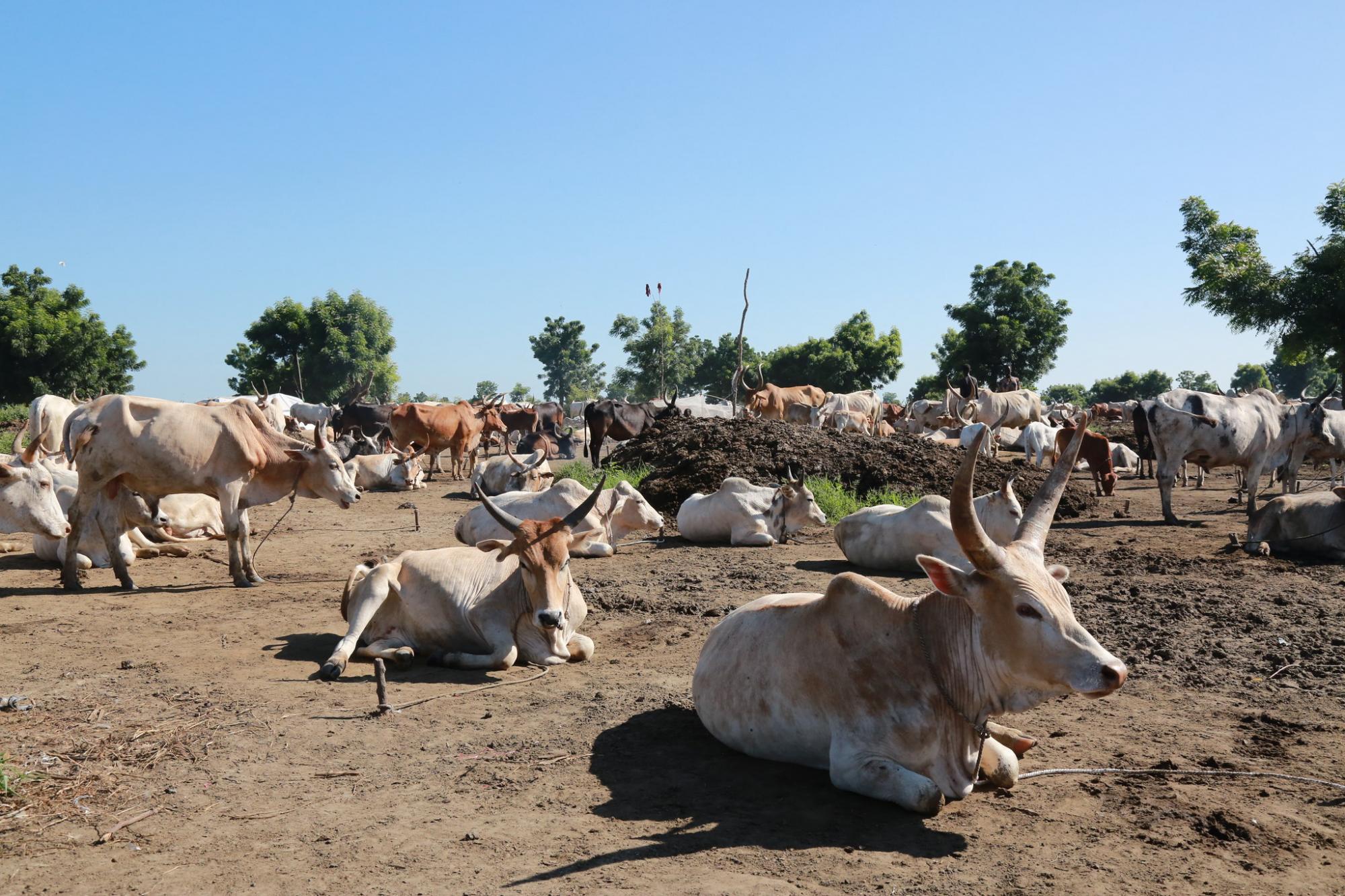
The impact of Covid-19 restrictions on agro-pastoral livelihoods
Things changed when the first case of Covid-19 was confirmed in South Sudan in April 2020. Local authorities in some parts of the country, including Rubkona County, enacted movement restrictions and NGOs launched aggressive public health campaigns promoting social distancing that warned of the potentially deadly consequences of physical proximity. While these initiatives may have helped curb the spread of Covid-19, people we spoke to explained that they also disrupted informal livelihood groups and thereby undermined communities’ abilities to carry out agricultural and livestock activities and support one another to cope during hardships related to Covid-19.
In Rubkona County, farmers explained that they had abandoned their plots in rural areas because movement restrictions had separated them from their fellow group members, and their belief that social distancing rules prevented them from working in proximity to their peers. In the absence of their group members, they said that it was impossible to tend to their plots or livestock in rural areas. One farmer in Rubkona told us: "No one is farming because people are afraid to move in groups. They say the virus catches people when they are close to each other. This has prevented us from moving to the fields, so we have given up. One cannot farm alone in South Sudan."
Others described similar disruption to cattle-keeping, resulting from the disbandment of livelihood groups. As a cattle-keeper living in Bentiu explained: “Young men used to move with cattle in our groups, but because of Corona, we could not. But we also could not move individually because we needed each other. People got afraid for their safety because of the isolation, and moved to town abandoning their farms and animals. We are in town now without any source of livelihood."
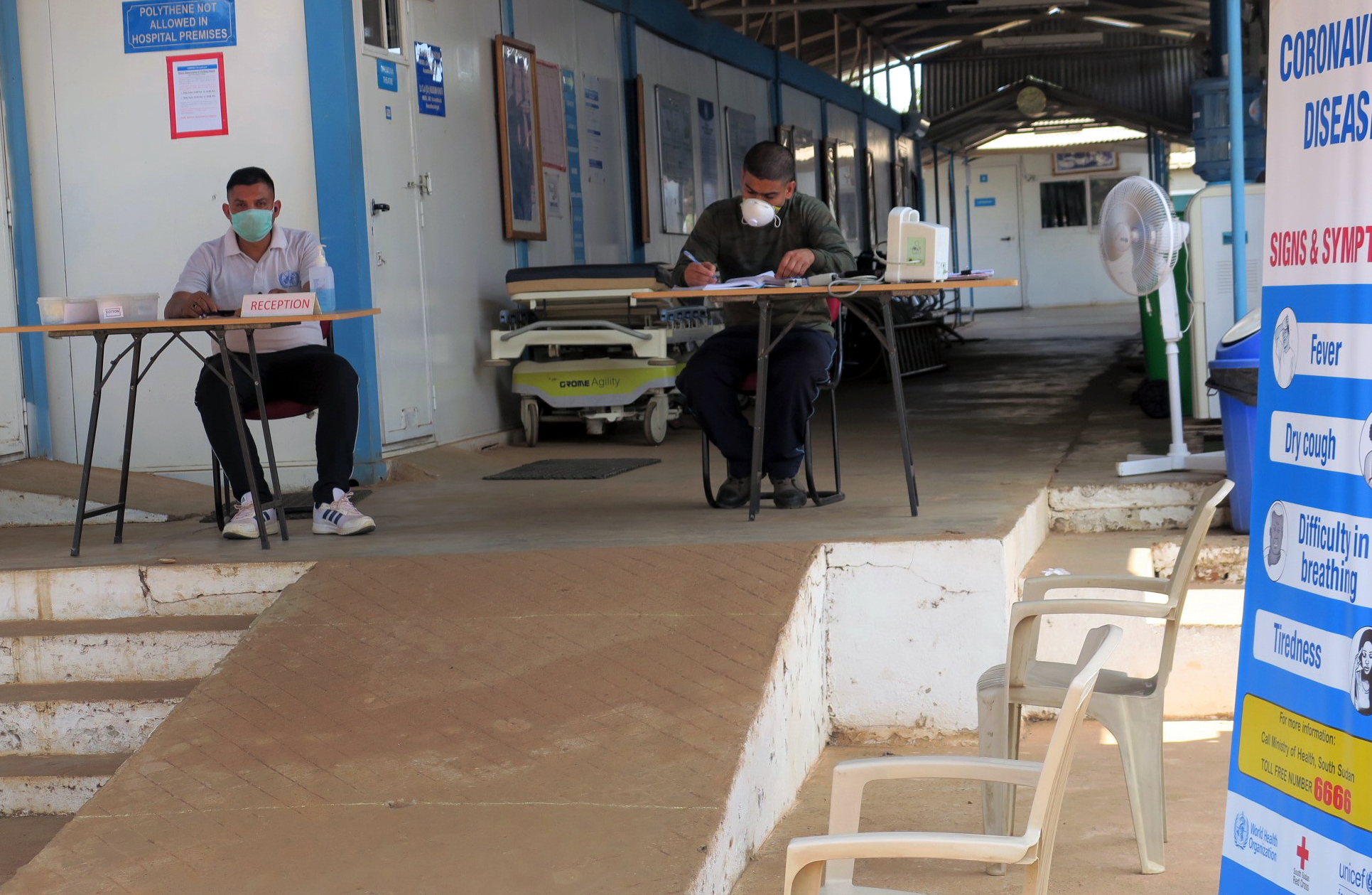
Farmers, pastoralists, and traders told us about other ways in which social interaction is important to their livelihoods. For example, they explained that a simple handshake, a shared meal, or a cup of tea are often prerequisites to any business negotiations in the local marketplaces. This is where they sell produce on which their livelihoods depend, such as milk, meat, livestock and crops. Larger social gatherings also play an important role in agro-pastoral livelihoods in South Sudan. Weddings and other community celebrations, for example, stimulate demand for produce and livestock consumed or gifted as bride-wealth. Participation in these events also allows people to build trust and strengthen supportive relationships with others in their communities, which in turn facilitates later business transactions.
But just as formal measures to curtail the spread of Covid-19 have disrupted the social groups in which farmers and herders conduct their work, they have also impeded these informal social interactions, with significant consequences for livelihood activities. A livestock trader in Bentiu explained: "Corona has destroyed social relations. South Sudanese love to live close to each other. Corona is even restricting handshakes and sitting in groups. How can I do business without greeting the customer?"
A farmer narrated similar frustrations, explaining that, in the market: "Customers think we are avoiding them intentionally when we refuse to shake their hands and the system of each person having his or her own cup for drinking is making people unhappy. It's not part of our tradition. It has created mistrust and resentment between people."
And another trader added: "I can no longer interact freely with my customers. Relations are broken and trust is lost... People think we are refusing to meet and mix with them and this is affecting me and my business."
Public health messaging
Why did communities in South Sudan conclude that it was impossible to conduct livelihood activities in social groups as a result of the pandemic? After all, surely it should have been possible for farmers and livestock keepers to tend to a plot or herd cattle in a socially distanced, safe manner? Yet many respondents reported having abandoned their livelihoods – at least in part – due to fear of contracting the virus from their fellow group members.
The answer may partly be because public health messaging, while effective in raising awareness about the virus, also sowed fear and confusion in communities. As one South Sudanese NGO worker in Bentiu said: "There were many serious signs and banners in towns [about Covid-19], but messages were not given widely, especially in rural areas. Public health messages got twisted by hearsay and rumours. Meanwhile, communities saw local health workers wearing masks and gloves and all manner of protective equipment, but none was easily available in the community. This was generating fear. The message went out strongly: 'if you catch corona, you will die'. But at the same time, [the community] was not given any alternatives and they are now fearful."
In other words, Covid-19 messaging seems to have inadvertently stifled community-driven livelihood adaptations and innovations.
Lessons for aid actors
As the aid community continues to respond to the Covid-19 pandemic, and begins to move towards vaccine-delivery efforts, what can be done to ensure that interventions are sensitive to the social nature of agropastoral livelihoods?
First, Covid-19 responses must carefully consider how public health messages are likely to be interpreted and acted upon by the communities they target. While NGOs may understandably be primarily concerned with ensuring that messaging achieves the intended public-health-related behavioural changes, they should also consider the potential secondary impacts of their campaigns. This includes anticipating consequences of their messaging on social livelihoods. Messaging should not only warn against the dangers of certain behaviours, such as gathering in close proximity, but should also provide information and resources to facilitate safe livelihood adaptations. For example, aid actors could encourage farmers and herders to adopt a system of using ‘pods’, where close social interaction is limited to small groups of families, rather than completely discouraged. These pods could be based on the informal livelihood groups in which households farm and keep livestock in South Sudan, and would better facilitate livelihood continuity during the pandemic.
Second, to ensure that public health campaigns – including efforts to promote vaccination against Covid-19 – achieve their intended results and do not inadvertently undermine the livelihoods of pastoralists, agro-pastoralists and farmers, aid actors need to think critically about how messaging is delivered, and who delivers it. Public health information must come from trusted community members and leaders, as well as from medical staff, international organisations or the government, as analysis of the Ebola response in Liberia, led by Mercy Corps researchers has highlighted.
Additionally, public health communication campaigns that prioritise meaningful community-based dialogue and feedback, rather than one-way, top-down messaging, are more effective in promoting behavioural change. Importantly, they also allow aid actors to proactively identify and mitigate unintended and avoidable livelihood disruptions stemming from their campaigns.
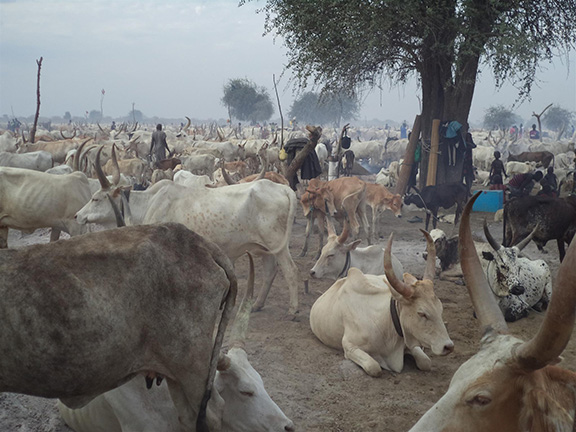
Social nature of farming and pastoralism cannot be ignored
Covid-19 is likely to remain a threat in South Sudan well into the future, due to inequitable vaccine accessibility and logistical challenges facing distribution campaigns in the country. As the aid community continues to prioritise critical public health interventions to curtail the spread of the disease, we must not forget that ‘one cannot farm alone in South Sudan’. To maximise the impact of Covid-19 interventions and ensure that they do not inadvertently exacerbate livelihood disruptions and undermine the resilience of pastoral and agro-pastoral communities, the social nature of farming and pastoralism must be at the forefront of programme design and implementation.
Future livelihood monitoring by SPARC
In the coming months, our research team will conduct follow-up interviews with the same farmers, herders and agropastoralists in Rubkona County, to gain further insight and monitor the evolving effects of the pandemic and other shocks on their livelihoods. As part of this initiative, we will continue to produce briefs on the changing context of agropastoral livelihoods in South Sudan. Our aim is to generate timely, evidence-based programming guidance for donors, programmes and policy-makers.
This article is part of a three-part SPARC learning project to understand how farmers, herders and those living in conflict-affected areas in South Sudan, Nigeria and Somalia are coping with and adapting to multiple shocks and stressors.
This feature, the first part of the project, highlights research on people’s lives, livelihoods and wellbeing. The second part captures people’s experiences of social cohesion, conflict and conflict mediation, and situates these within broader security contexts gathered from government, research and non-governmental organisation (NGO) reports and media sources. The third piece, coming online later in 2021, will monitor rangeland, livestock and market conditions.
Together, the three pieces will help us to understand how farmers, pastoralists and agro-pastoralists in drylands are making decisions as conditions change with time. The research will also enable us to ground recommendations to donors, NGOs and local and national governments on how to assist these groups more effectively, and support and complement locally led resilience actions.
At SPARC, we want to broaden the range of people we hold these conversations with, both in South Sudan and in other countries, and would like to know how to make our conversations and these updates more useful. Organisations interested in collaborating with us to do this can contact: [email protected] or [email protected].
Endnotes:
[1] The research team consisted of two South Sudanese researchers who conducted field interviews in the Nuer language and drafted detailed interview notes in English. Internationally based researchers affiliated with Mercy Corps and ODI subsequently worked with the locally-based researchers to analyse the data and co-author this article.
[2] Of our respondents, 16 identified their primary livelihood as farming, 19 as pastoralism, and 8 as agro-pastoralism. Of our 45 total respondents, 15 were female and 30 were male.
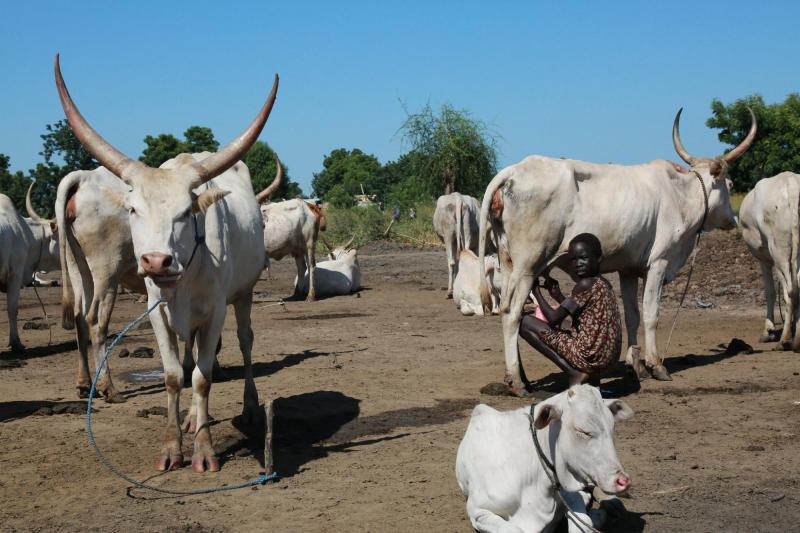
United Nations Mission in South Sudan (UNMISS) Ghanaian Battalion providing much needed veterinarian services, free of charge, Bentiu, South Sudan
Credit Image by Nektarios Markogiannis / UNMISS - CC BY-NC-ND 2.0
